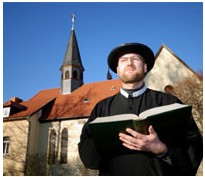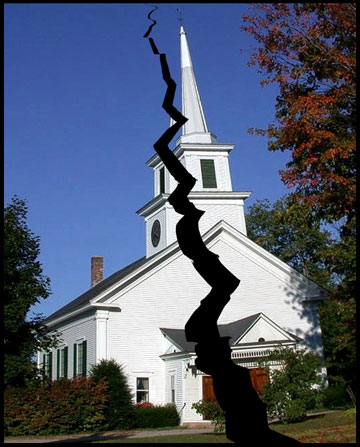Splits in the foundations
The current problems besetting the Free Church of Scotland are symptomatic of fundamental issues which are wreaking havoc across the presbyterian world and the denominations beyond.
first published 13/03/2011
A signifcant salvo
 In what has been dubbed ‘Worship Wars’, a heavy artillery barrage has just been fired. In what has been dubbed ‘Worship Wars’, a heavy artillery barrage has just been fired.
In weekly newspapers right across the patch, five former moderators of the Free Church of Scotland have issued a call to the rank and file to protest last November’s decision to protest the decision to allow local congregations freedom to choose on matters relating to what can be sung and whether instrument should be used.
The issue of ‘worship’ has unearthed a host of other problems for the denomination – but not just for the Free Church. It does however suggest that the present crisis could result in yet another split in the ranks of what – in 1900 – became dubbed the ‘Wee Frees’ when the bulk of the denomination left to form the United Free Church. (In 1929, the UF Church subsequently reunited with the Church of Scotland.)
The problems within the Presbyterian denominations relate to their slavish and legalistic reliance in formulating church practice on a 17th-century document which, amongst other extra-biblical strictures, seeks to define what is and is not acceptable as ‘worship’. Coupled to this, there is the range of diversity within the Free Church relating to age, demographics, language, and old and new traditions which work against maintaining an overarching uniformity. Additionally and compounding the situation is the split just over a decade ago which further reduced the denomination’s size, credibility and confidence.
Meanwhile as we see many other mainstream denominations fall apart over human sexuality and numerical decline, our world is gripped in the chaos of earthquakes, civil wars, terrorism, economic collapse, massive flooding, raging fires and a host of concomitant humanitarian issues. To have God’s human instrument on earth in such disarray at any time is lamentable: at a time such as this it compounds the tragedy.
Faulty Model
 Whilst there are a great number of fine disciples of Christ in leadership positions within the churches, a very significant part of the whole problem is the widespread failure to understand any model for the church (in the sense of the body of God’s people) that falls outside of the pattern of buildings, Sunday morning gatherings and a passive audience. Whilst there are a great number of fine disciples of Christ in leadership positions within the churches, a very significant part of the whole problem is the widespread failure to understand any model for the church (in the sense of the body of God’s people) that falls outside of the pattern of buildings, Sunday morning gatherings and a passive audience.
The constricted thinking which sees Christianity being reduced to one holy day, in one holy building, with one holy man dressed in holy clothes performing a holy ritual, does a gross disservice to the biblical calling of the Great Commission as presented to and outworked through the priesthood of all believers.
But for as long as the institutional model and the thinking that attends it persists, we will only ever see proposed ‘solutions’ that are predicated on the need to preserve these support structures – albeit in modified form from time to time as crises arise. So the deckchairs just get moved again while the great ship continues to sink. (And for those contemplating ‘jumping ship’, security will not be found in some other sinking vessel, but rather by learning to swim.)
 Biblical Model Biblical Model
There is an answer to all of this, but it lies more in the model presented to us in the post-Pentecost pages of scripture which – if that component of the whole church which deems itself to be ‘Bible-believing’ would only take and apply seriously – displays a mind-blowing dynamic of the power of God amongst and through the followers of Jesus Christ into the surrounding world.
As these early believers lived their lives with integrity and commitment within their local situations the Holy Spirit was powerfully in evidence. Without the trappings of all the religious machinery that we have since assembled, God so moved that He added daily to their number those who were being saved. Such was the work of God upon them that multitudes were drawn to the faith whilst others, recognising the extent of the power at work dared not draw near.
 So in our present plight within the churches, denominational realignment just will not do: it would merely produce more of the same. So in our present plight within the churches, denominational realignment just will not do: it would merely produce more of the same.
However to move away from present models of ‘church’ would require acts of real faith; and not least on the part of those whose regular incomes derive from the structures within which they currently operate.
True faith is hang-gliding WITHOUT a hang glider
 Pray for displays of such courage that will take God’s Word and His promises of daily provision to heart and mind. Pray for displays of such courage that will take God’s Word and His promises of daily provision to heart and mind.
Without these things the religious and denominational structures and machinery which constitute present-day churchianity will continue to fail a fallen and disintegrating world.
True leadership under God is not occupying an office or holding ecclesiastical rank: it is setting an example which others will recognise as valid and will enthusiastically follow.
|